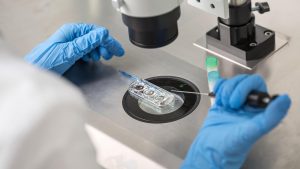A woman is always cited as the dominant factor which affects fertility, but several studies have revealed that the age of the man also has a significant impact on the effectiveness of IVF treatment.
Recently, the Progress Educational Trust (PET) held an event solely dedicated to male fertility in Edinburgh, Scotland looking at the topic of the male biological clock. The conference covered aspects of male infertility, specifically the effect the age of the male patient has on the ability to conceive.
Previous studies have revealed that the quality and the quantity of the sperm begin to diminish with a man’s age and when an older man does succeed in conceiving a child, there’s an increased chance of DNA damage and genetic mutations. These abnormalities result in an elevated risk of a child with congenital defects, psychiatric conditions and will increase the risk of miscarriage during the pregnancy.
Some facts about male fertility and age…
- On an average, it takes four months to conceive if the man is 25 or less. If he is over 40, it may take up to 2 years or longer.
- If the male is over 45, there is a five-fold increase in the time-taken for conception.
- If the couple undergoes IVF treatment, the risk of not conceiving is five times higher if the male is over 41 years of age.
- Semen volume and sperm motility declines between 20-80 years of age.
- The risk of miscarriage was 27% more likely in women whose partners were over 40 years of age.
- And men’s age affects much more than female fertility. As a man gets older, his likelihood of having a healthy child will also decline.
Children with fathers over the age of 40 were four times as likely to develop disorders such as schizophrenia and autism.
However, the good news is that much of this is related to increased sperm DNA damage and lifestyle factors. That is why, at Fertility First, all men have their sperm DNA levels tested in our purpose build laboratory, one of only a few in the country, as part of a couple’s initial male fertility assessment. A regime of antioxidants and lifestyle changes are usually sufficient to reverse this damage, and therefore the risks, as new sperm are made.
Depending on the severity of the DNA damage the sperm might need to be retested prior to treatment to ensure back to normal DNA levels. In many cases, these male fertility treatments mean that IVF treatment is no longer necessary, and a couple can use simpler, easier treatments to get pregnant.
To find out how you can improve your sperm count naturally, read 8 foods to improve sperm count.






